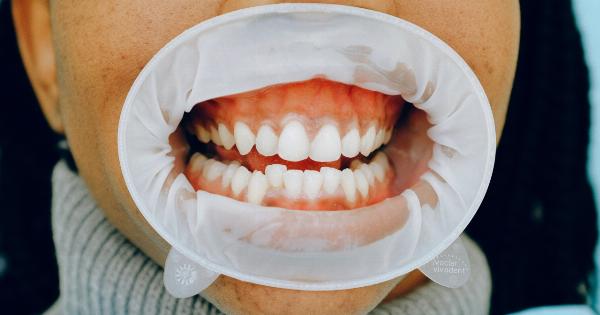Bleeding gums can be a common problem that many people face.
If you’ve noticed blood in the sink while brushing your teeth or experienced bleeding gums when flossing, it’s important to understand the underlying causes and how to effectively address them. In this article, we will explore the various factors that contribute to bleeding gums and provide valuable insights on prevention and treatment.
Understanding the Causes
There are several reasons why you might be experiencing bleeding gums. Let’s take a look at some of the most common causes:.
Poor Oral Hygiene
One of the major causes of bleeding gums is inadequate oral hygiene. Failing to brush and floss regularly can lead to the buildup of plaque, which contains harmful bacteria. Over time, this can cause gum inflammation, leading to bleeding gums.
Gingivitis
Gingivitis is a mild form of gum disease that occurs due to the accumulation of plaque. When plaque isn’t thoroughly removed from the teeth and gumline, it can harden into tartar, irritating the gums and causing them to bleed.
If left untreated, gingivitis can progress to more severe forms of gum disease.
Pregnancy Gingivitis
Pregnant women are more prone to experiencing bleeding gums due to hormonal changes in the body. Increased hormone levels can cause the gums to become more sensitive and susceptible to gum disease.
Medical Conditions
Certain medical conditions, such as diabetes, leukemia, and vitamin deficiencies, can also lead to bleeding gums. These conditions weaken the immune system or affect blood clotting, making the gums more prone to bleeding.
Medications
Some medications, like blood thinners and certain antidepressants, can increase the likelihood of bleeding gums. If you are taking any medications and notice bleeding gums, it’s essential to discuss this with your healthcare provider.
Prevention and Treatment
Now that we understand some of the causes of bleeding gums, let’s explore effective prevention and treatment methods:.
Maintain Good Oral Hygiene
Practicing proper oral hygiene is crucial in preventing bleeding gums. Brush your teeth at least twice a day, using a soft-bristled toothbrush and fluoride toothpaste.
Additionally, make sure to floss daily to remove plaque and debris from between your teeth.
Regular Dental Check-ups
Don’t neglect dental visits. Regular check-ups are essential to identify any early signs of gum disease or other oral health issues. Your dentist can provide professional cleanings to remove tartar and monitor the health of your gums.
Use a Mouthwash
Consider incorporating an antimicrobial mouthwash into your oral hygiene routine. This can help reduce the amount of harmful bacteria in your mouth, promoting healthier gums and preventing bleeding.
Healthy Diet
A well-balanced diet rich in vitamins and minerals is crucial for maintaining healthy gums. Adequate intake of vitamin C and calcium, for example, can strengthen your gums and support overall oral health.
Quit Smoking
Smoking not only negatively impacts your overall health but also increases the risk of developing gum disease. Quitting smoking can significantly improve the health of your gums and reduce the likelihood of bleeding.
Manage Stress
Chronic stress can weaken the immune system and contribute to gum disease. Incorporating stress management techniques such as meditation, exercise, or therapy can help maintain healthy gums.
Medical Intervention
If your bleeding gums persist despite adopting proper oral hygiene practices, it’s important to consult with a dental professional.
They may recommend additional treatments or procedures, such as deep cleaning, antibiotic therapy, or gum surgery, depending on the severity of your gum disease.
Conclusion
Bleeding gums should never be ignored. They can indicate underlying oral health issues that require attention and treatment.
By understanding the causes of bleeding gums and implementing preventative measures, such as maintaining good oral hygiene and regular dental check-ups, you can combat this problem effectively. Remember, the key to healthy gums lies in consistent care and prompt intervention to ensure a lifetime of beautiful smiles!.


























